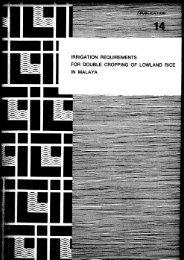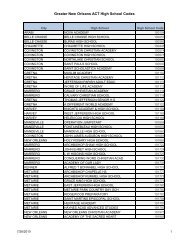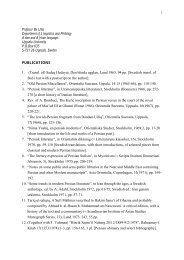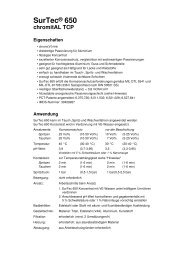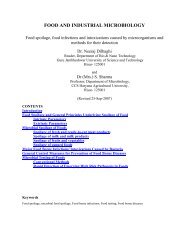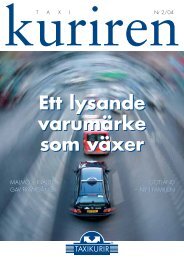On the Future of Indigenous Traditions - Munin
On the Future of Indigenous Traditions - Munin
On the Future of Indigenous Traditions - Munin
You also want an ePaper? Increase the reach of your titles
YUMPU automatically turns print PDFs into web optimized ePapers that Google loves.
3.5. The “Tribe” /Adivasi identity in conflict with <strong>the</strong><br />
State?<br />
The issue <strong>of</strong> <strong>the</strong> Adivasis’ identity, earlier represented through <strong>the</strong>ir customary<br />
institution as a political association in <strong>the</strong> more recent years in Jharkhand (referred to<br />
as “tribe” by Weber as opposed to <strong>the</strong> “caste”). The Adivasis here more than one<br />
ethnic group and a homogenous cultural group, who have been through a historical<br />
process <strong>of</strong> defining <strong>the</strong>ir political identity now have to find a place in <strong>the</strong> discourse<br />
<strong>of</strong> <strong>the</strong> modern nation-state. (This too has been <strong>the</strong> issue with Adivasis in o<strong>the</strong>r parts <strong>of</strong><br />
India) As in <strong>the</strong> previous chapters I have referred to Adivasis’ struggle as an ethnolingual-cultural<br />
group against <strong>the</strong> colonial administration. In <strong>the</strong>se context Adivasis’<br />
customary systems have been a part <strong>of</strong> <strong>the</strong>ir culturally evolved political association,<br />
and proven to be a source <strong>of</strong> <strong>the</strong>ir political strength. However, what failed <strong>the</strong><br />
Adivasis to maintain this identity <strong>of</strong> <strong>the</strong>ir in <strong>the</strong> post-colonial time? Most <strong>of</strong> <strong>the</strong> rules<br />
and laws for this part <strong>of</strong> India (Jharkhand) as well as for <strong>the</strong> whole country were made<br />
during <strong>the</strong> era <strong>of</strong> colonial rule; in many ways, <strong>the</strong>y still are <strong>the</strong> backbones <strong>of</strong> <strong>the</strong><br />
present day Indian state. With <strong>the</strong>se questions we can also point at <strong>the</strong> basis <strong>of</strong> why<br />
and <strong>the</strong> Adivasis association is important as asked in <strong>the</strong> third point raised in <strong>the</strong><br />
beginning <strong>of</strong> this chapter. It is also <strong>the</strong> importance and <strong>the</strong> scope <strong>of</strong> Adivasis political<br />
association in <strong>the</strong> present context and also within <strong>the</strong> Adivasis <strong>the</strong>mselves. Has <strong>the</strong>ir<br />
identity based on collective social system failed <strong>the</strong> Adivasis?<br />
It is important to start with <strong>the</strong> <strong>the</strong>oretical interpretations <strong>of</strong> <strong>the</strong> concepts <strong>of</strong> Adivasis<br />
identity, and see if it is <strong>the</strong> same as ethnic identity and its relation to Adivasis<br />
political association. In this regard Amit Prakash taking <strong>the</strong> case <strong>of</strong> Jharkhand<br />
explains how implementation <strong>of</strong> public policy influences <strong>the</strong> political identities<br />
premised on ethnic, linguistic, and religious or o<strong>the</strong>r similar grounds. He observes that<br />
<strong>the</strong> failure <strong>of</strong> development policies to intervene socio-economic conditions<br />
encourages societal groups to organize <strong>the</strong>mselves as political identities. He also<br />
stresses that <strong>the</strong> issue <strong>of</strong> identity both in political and ethnic terms appears more<br />
sharply. Prakash opens this discussion by saying that we can, “after locating [at] <strong>the</strong><br />
71





